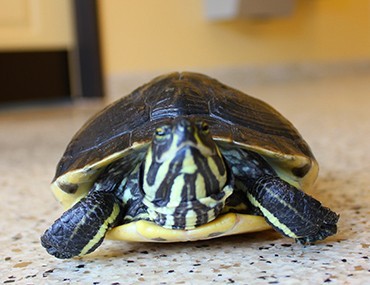
Dr. Laurie Hess goes in depth on some of the most common reptile pets. For more from Dr. Hess, find her on Facebook!
Last week, I went over some common reptiles that make great pets. This week, I'd like to continue that discussion in Part two of my reptile blog. Below are two more great options for anyone looking to add a reptile to their family.
1. Red eared slider turtle
These are hardy turtles that spend some time swimming and some time basking out of water on rocks and logs. They live in aquariums containing water at least 1.5-2 times as deep as their body length. Water should not reach too close to the tank top, or the turtle may escape. Sliders must be moved to bigger tanks as they grow. Water in the tank should be heated with submersible heaters to 75-85°F and should be kept clean with an automatic filter in addition to weekly changes of 25-50% of the total water. Sliders also need an out-of-water basking spot that is heated with an over-the-tank heat light to 85-90°F. In addition, like many other reptiles, sliders should be exposed to UV-B light to enable them to properly absorb calcium from their food. While sliders eat both vegetables and animal protein, younger sliders require more animal protein, while adults eat more vegetables. Young turtles should be fed daily, while adults can eat every other day. Several good commercial pelleted diets are available for sliders, in addition to dark leafy greens such as collard, mustard, and dandelion greens, plus carrots, squash, green beans and limited amounts of fruit such as apple, melon, and berries. Occasional live feeder fish and worms can be offered occasionally to stimulate sliders’ predatory instincts. Raw or frozen meat, as well as cat and dog chow, should be avoided. A balanced vitamin supplement also should be fed a couple of times a week. When fed and housed properly, pet sliders can live 50 or more years.
2. Greek tortoise
These gold to olive-colored tortoises tend to remain smaller (6-8” long) than other species of tortoise and therefore may be more manageable as pets. They are housed in glass aquariums or large plastic bins that must be increased in size as the animals grow. Shredded paper in which they can burrow and dig works well as bedding. Large flat rocks on which to climb, a cardboard or plastic box in which to hide, and a shallow bowl of water from which to drink and soak, should also be provided. Heat is essential for tortoises; the basking area should be kept at about 95°F, while the cool zone in the tank should not fall below about 75-80°F. Overall night time tank temperatures should not be lower than 75°F. Exposure to UV-B light is key for proper calcium absorption from food and for proper bone development. If kept in a safe enclosure, these tortoises benefit from direct outdoor sunlight during warm months or in warm climates. These tortoises are herbivores that should be fed a variety of leafy greens including kale, dandelion greens, collards, parsley, clover, and endive, plus hay and a very limited amount of fruit including berries and apples. Vegetables should be dusted with calcium powder 2-3 times per week. Cat and dog food has too much protein and should not be fed to these tortoises. Greek tortoises can make great pets for families and can live 50 years or more when cared for properly.
Remember, if you’re considering a reptile as a pet, whichever one you choose, remember always to wash your hands after handling them, as all reptiles, in general, carry Salmonella bacteria plus other bacteria and parasites that may be transmittable to people. Also, supervise all small children when they handle these pets, as the quick movements of young children can startle and scare these animals. Finally, once you get your new reptile family member, be sure to visit a reptile-savvy vet to have him/her checked and to make sure you’re caring for him/her properly. Remember, many reptiles are so long-lived that if you take care of them right, they may outlive you!
If you have any questions or concerns, you should always visit or call your veterinarian – they are your best resource to ensure the health and well-being of your pets.
